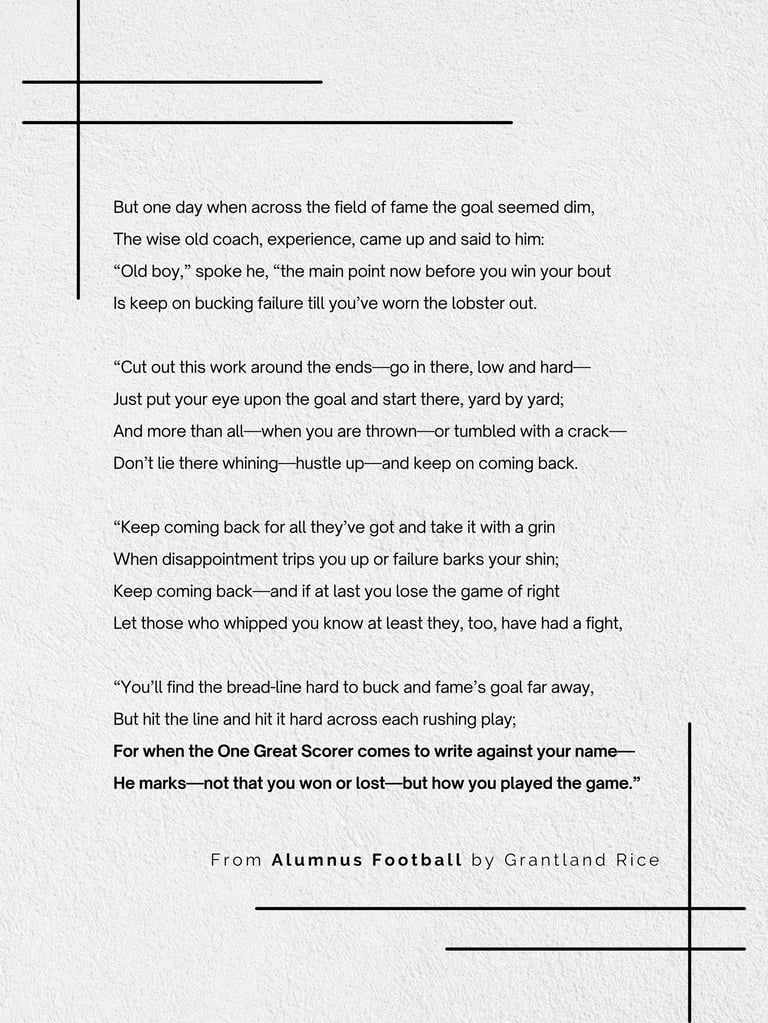Parlance of the Times: Alumnus Football, Grantland Rice
Ride shotgun with Southland Sports on a historical trek to glory days gone by through wise words and wry wit from the best to ever put pen to paper in the name of sport. We begin as we should: with Murfreesboro, Tennessee’s own Grantland Rice—the OG sportswriter—who was the most powerful and far-reaching voice in U.S. sports for nearly half a century.
Maggie Lane | Southland Storyworks


The Man Behind the Myth
Rice was born in 1880, steeped in the traditions of the South and raised in Nashville. At Vanderbilt University he captained the baseball team, showing enough skill to attract pro scouts—until his father put his foot down and forbade him from signing. So Rice turned to the newsroom. He cut his teeth in Nashville and Atlanta, where he first chronicled a fiery young outfielder named Ty Cobb, before moving through Cleveland and back to Tennessee.
From the start, Rice wrote differently. Sports, in his view, were not just games but grand allegories. He lifted his language from Olympus and Troy, mixing myth and metaphor into game stories. By the time he landed in New York in 1911, his syndicated columns reached millions. He gave athletes names that still echo—the “Galloping Ghost” for Red Grange, the “Four Horsemen” of Notre Dame—and made legends out of Ruth, Dempsey, and Bobby Jones. Rice wasn’t merely reporting sport; he was shaping American culture.
Verse as Playbook
But Rice didn’t only write prose—he wrote verse. Sometimes sentimental, sometimes stirring, always accessible. In 1908, at the Nashville Tennessean, he published Alumnus Football, a poem that began as a nod to the game but became something larger: a playbook for life itself.
Here’s the heart of it:
“Cut out this work around the ends—go in there, low and hard—
Just put your eye upon the goal and start there, yard by yard;
And more than all—when you are thrown—or tumbled with a crack—
Don’t lie there whining—hustle up—and keep on coming back.”
The advice is football in form, but universal in substance. It’s not about alumni, not even really about football. It’s about persistence—the triumph of the human spirit when faced with setbacks, failures, and the inevitability of being knocked flat.
Keep Coming Back
Rice names the bread line, the sting of failure, the distant shimmer of fame’s goal posts. Yet he doesn’t exalt winning. He exalts returning. Hustling up. Coming back. Even if you lose, make your opponent remember the fight. Even if the world hands you disappointment, take it with a grin.
That’s the message: we can’t quit. To stop chasing, striving, and playing would be to resign ourselves to a meaningless stalemate—a life of nil-nil draws. Better to hurl ourselves into the line again, yard by yard, play by play, until the whistle blows.
The One Great Scorer
Rice’s most famous couplet closes the piece:
“For when the One Great Scorer comes to write against your name—
He marks not that you won or lost—but how you played the game.”
It has been quoted so often it risks cliché, but in the moment of its first printing—and even now—it cuts clean. We aren’t remembered for the ledger of wins and losses, but for the spirit we brought to the fight.
And so, Parlance of the Times begins here: not with a box score, but with a charge. Don’t whine when you fall. Don’t stay down. Keep coming back. Because the only thing worse than losing the game is quitting it altogether.
